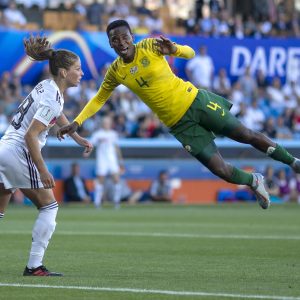Andisiwe Mgcoyi, the bulldozer who paved the way
The Banyana Banyana striker’s exploits in Europe have changed perceptions and opened doors for many South African footballers, who are now cropping up in the best women’s leagues overseas.
Author:
13 February 2021

Andisiwe Mgcoyi takes her nickname, Gudluza, literally. The 32-year-old Banyana Banyana forward not only bulldozes her way past opposing defenders to create space for her teammates but her exploits in Europe have also paved the way for the large legion of South African footballers making a name for themselves abroad in the women’s game.
The nickname she has come to embody was coined during the 2013 Cyprus Women’s Cup. “During training, Shakes Mashaba told me about a [Netherlands] player who wore jersey No. 17. He said that I needed to gudluza her, and after that day he declared that I be called Gudluza because I was able to push through players to get goals,” she remembers, referring to the former Bafana Bafana coach who was part of Banyana coach Joseph Mkhonza’s brains trust.
The towering striker is one of the most hardworking and fearless players to have donned the South African colours. This, along with her determination, has made her one of the country’s most consistent players to ply their trade in Europe. Her tenacity has helped her gudluza her way through six European leagues since 2013.
Related article:
From her early playing days in Khayelitsha, Cape Town, Mgcoyi knew she would play football in Europe. But for her dream to come true, she had to impress the national scouts for a chance to trial for the senior national women’s team. A match between rivals Cape Town Spurs and Cape Town Roses gave her the opportunity to catch the eye of Banyana’s coaches.
“We were invited to a camp and we were made to play against players who had already been in the Banyana team. Scouts had chosen 18 players from around the country to this camp. Coach [Augustine] Makalakalane was impressed by my performance,” she remembers.
Mgcoyi wanted to use Banyana international matches played in Europe as a springboard to move overseas. Although she impressed the Banyana coaching staff, Mgcoyi missed out on the 2010 Women’s Africa Cup of Nations (Afcon), which South Africa hosted with the team finishing third. Mgcoyi had to wait a little longer before she could represent her country.
“My first trip was Cyprus [Women’s Cup in 2012]. I was still struggling to adapt to the team. I remember I was told that I needed to lose weight. But I was happy that my first trip was to Europe. It gave me confidence that I can open more doors. My dream was to play in Europe. I believed in myself and told myself that if I get one team, I will never go back to Mzansi again. I never gave up,” she says.
Realising her Champions League dream
Mgcoyi’s European sojourn began in 2013 with FK Union Nové Zámky in Slovakia, where she played for three seasons and won the Slovak Cup. The club gave Mgcoyi her first taste of the Uefa Women’s Champions League.
“I used to watch the Champions League on TV and I wanted to play there. It was surreal when I played in the Champions League for the first time. I was emotional, I felt like crying. It feels like the World Cup,” she says.
South Africa has seen a rise in the past few years in players moving abroad, not only to experience professional football for the first time but also to play at the highest level. There are, however, some players who play for only a season and don’t return to that country again.
“To be honest, most of us South African players are spoilt,” Mgcoyi says, “especially players that are in the national team. You’d find that when we’re travelling with the national team and we get bad accommodation, we are never patient about that kind of situation. I believe when you’re in Europe, chances of you finding another club there are many [which is why players have to stick it out],” she explains.
Related article:
Hungary, Austria, Albania, Germany and now Kosovo are countries Mgcoyi has called home. Along with fellow South African defender Zanele Nhlapo, she began their stay at KFF Mitrovica on a high by winning the Kosovo Cup in November. This was after Mgcoyi’s successful spell in Albania, where she was the second assistant coach while also playing.
“I believe that I still have the chance to play in Europe’s big leagues. Some players would get offers from smaller teams but they turn down those offers because of money. I told myself that I would go wherever God places me because sometimes when you love something, it’s not about the money. Yes, we need the money, but we also need growth in football because European and Mzansi football is not the same,” she says.
Why SA lag behind
The inadequate development structures in women’s football is one of the reasons Banyana players lag behind their European, Asian and even Americas counterparts. A club like Liverpool, for instance, starts their development structure at Under-9 in their women’s side. Mgcoyi says that because girls are introduced to structured football at a young age in countries like England, they are able to develop technique quite early.
“In South Africa, we believe more in running. But in Europe, they believe more in ball work. From warm-up to fitness, it’s all about ball work. If you don’t have technique in Europe, no matter how fit you may be, you won’t survive,” she says.
“We still have a lot to do in South Africa. If you take a 10-year-old from Europe and a 10-year-old from Mzansi, you can tell the difference. The way they groom their players is not the same as in South Africa. There’s a huge difference. We need more places like the HPC [TuksSport High School, which forms part of the High Performance Centre at the University of Pretoria]. We have to develop players from a young age, correctly, focus on each player and mould them to what they can be,” she says.
Her stay in Europe also scored her a job with an Albanian beauty and skincare company, Alexandra Organic Beauty Co, making her the first South African athlete to be made the face of a beauty brand. Representatives of the cosmetic company headhunted her after seeing her play for KF Apolonia. Her experience with agents who don’t have players’ interests at heart drove her to market herself to potential teams and negotiate her own contracts.
Although Mgcoyi last played for Banyana in the 2016 Women’s Afcon, she still hopes to don the green and gold again. She has 20 goals in 42 appearances for Banyana, including matches in three Afcons, Banyana’s Olympic Games debut and the All Africa Games. A foot injury in early 2017 saw her excluded from the Cosafa Women’s Championship squad and she is yet to make her way back into coach Desiree Ellis’ team.
“You know when you look for a team overseas, they look at if you have played for the national team,” she says. “If you have never played for the national team, the chances of being signed by the club are lessened. Scouts attend tournaments we play in because European teams are always looking to sign African players. Being in the national team has opened doors for me. If I can get the opportunity again, I would not turn it down. I don’t think about it though, but if I would get the call-up, I would honour it and do the job that I am called for.”


